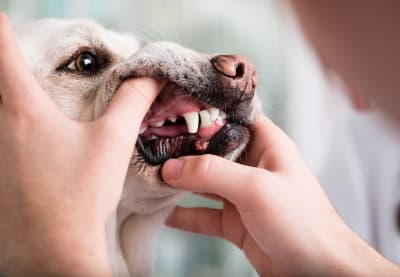What is periodontal disease in dogs?
Periodontitis bacteria can infect your dog’s oral cavity. Usually, this disease silently invades the mouth and you won’t see any pervasive signs or symptoms until it advances. However, gum disease may cause chronic pain, gum erosion and loss of bone and teeth. The structures supporting the teeth can also be weakened or lost.
When bacteria and food particles collect along the gum line and are not brushed away during a regular tooth brushing, they can develop into plaque and harden into calculus we know as tartar. This causes irritation and inflammation of the gum line and surrounding areas (the condition is also referred to as gingivitis). This represents the first stages of gum disease.
What are symptoms of periodontal disease in dogs?
There are some hallmark symptoms of canine periodontitis pet parents should watch for, including:
- Bleeding or inflamed gums
- Discolored teeth (brown or yellow)
- Loose or missing teeth
- Bad breath (halitosis)
- Irritability
- Weight loss
- Bloody or “ropey” saliva
- Drop in appetite
- Favoring one side of the mouth when chewing
- Excessive drooling
- Blood in water bowl or on chew toys
By the time signs of advanced periodontitis appear, your dog could be in significant chronic pain, during which our pets tend to instinctively self-isolate to keep from showing weakness to predators.
Unfortunately, the affects of periodontal disease don’t stay confined to your dog’s mouth - the condition can cause issues with major organs and lead to heart disease, since bacteria from the mouth can enter the blood stream and settle in around the heart.
What causes periodontal disease?
Bacteria in your pooch’s mouth can accumulate and eventually develop into plaque, which meets other minerals and hardens within two to three days. Calculus then forms on the teeth and gets more difficult to scrape away.
The immune system will begin to fight this buildup of bacteria, causing reactions such as inflamed gums and more obvious signs of gum disease.
Diet and poor nutrition can factor into whether your dog will develop periodontal disease, as do environmental contributors such as grooming habits (does your pooch lick himself frequently?), dirty toys, the alignment of teeth (pups with crowded teeth are more susceptible to gum disease), and oral hygiene.
How is periodontal disease in dogs treated?
Costs of dental procedures such as teeth cleanings may vary widely depending on the level of care provided by your veterinarian, your pet’s needs, and other factors. Your pet will need to have blood work before being put under anesthesia to ensure she’s healthy enough for the medication, which can cause problems for dogs with organ diseases.
Any dental procedure should include:
- A complete set of dental radiographs
- IV catheter and IV fluids
- Pre-anesthesia blood work
- Circulating warm air to ensure patient stays warm while under anesthesia
- Endotracheal intubation, inhaled anesthetic and oxygen
- Anesthesia monitoring
- Scaling, polishing and lavage of gingival areas
- Local anesthesia such as novocaine, if any extractions are needed
- Pain medication during and after the procedure
How can I prevent my dog from getting periodontal disease?
Fortunately, we pet parents can prevent our pooches from getting periodontal disease, and the condition can be treated and reversed - if detected early.
When it comes to your dog’s oral health, don’t neglect it or procrastinate. Similar to their people, they require regular dental appointments to keep up with oral hygiene and identify any trouble spots. Your pup should go to the vet’s at least once each year to have her oral health evaluated.
You’ll also have the chance to ask any questions you may have regarding at-home care, and find out how often your pet should come in for professional teeth cleanings (as those with issues may need to come more frequently).
Prevent issues from developing into unmanageable situations between appointments by doing a daily brushing of your dog’s teeth to prevent bacteria and plaque from getting a foothold (choose a toothpaste made specially for dogs).
There are also dental chews, dog food and chew toys designed to address dental disease and reduce tartar development. But fair warning: don’t try to replace brushing with these - think of them as an add-on to regular oral care). If you notice inflamed or swollen gums, missing teeth or even appetite changes, book an appointment immediately.
Note: The advice provided in this post is intended for informational purposes and does not constitute medical advice regarding pets. For an accurate diagnosis of your pet's condition, please make an appointment with your vet.
Is your dog due for an annual dental appointment? Our Greensboro vets can check your pet's health to ensure his teeth and gums are in good condition. Book an appointment today.
Looking for a vet in Greensboro?
We're always accepting new patients, so contact our veterinary hospital today to book your pet's first appointment.
Related Articles View All
What happens during a routine pet exam?
Routine wellness exams are a proactive way to help safeguard your pet's long-term health and vitality. Why should you take your healthy pet to the vet? What happens during a pet health wellness exam? Find out.
How much does an emergency vet visit cost?
Emergency veterinary care can be costly, but planning ahead allows you to make decisions about your pet's care based on their needs rather than financial restrictions. Today, we look at the cost of emergency vet care, and how to be ready if your pet needs emergency treatment.
Kidney Failure in Dogs
Chronic and acute kidney failure are serious health problems commonly seen in dogs. Here, you will learn about the differences between chronic and acute kidney failure in dogs, the signs to watch for and how these conditions are treated.
Signs of Bladder Infections in Dogs & How They Are Treated
Many dogs suffer from bladder infections and other issues affecting the urinary tract system. What causes bladder infection in dogs? What signs should you watch for? How do vets treat bladder infections in dogs? Read on to find out.


